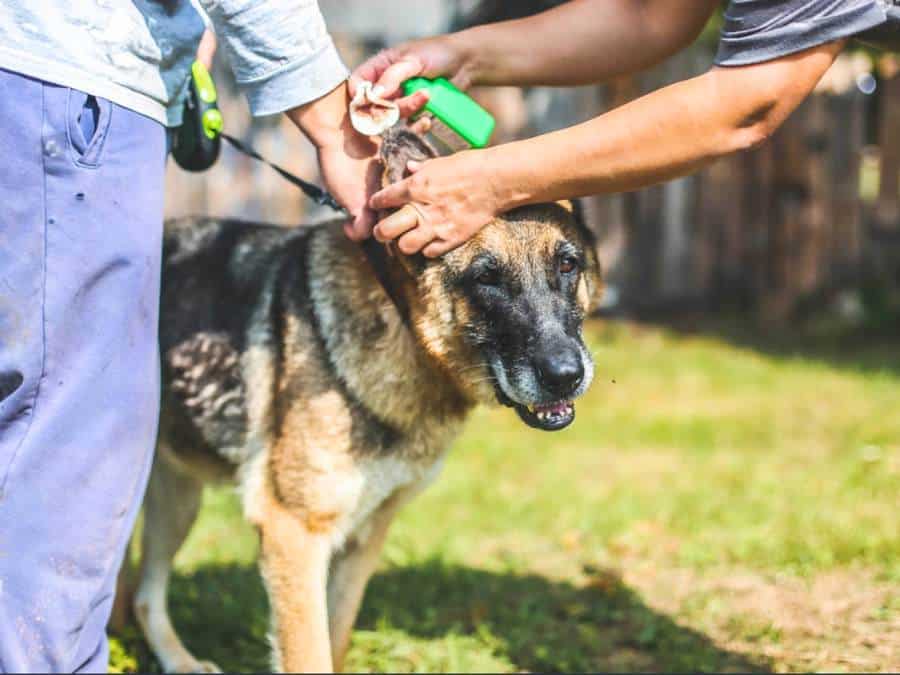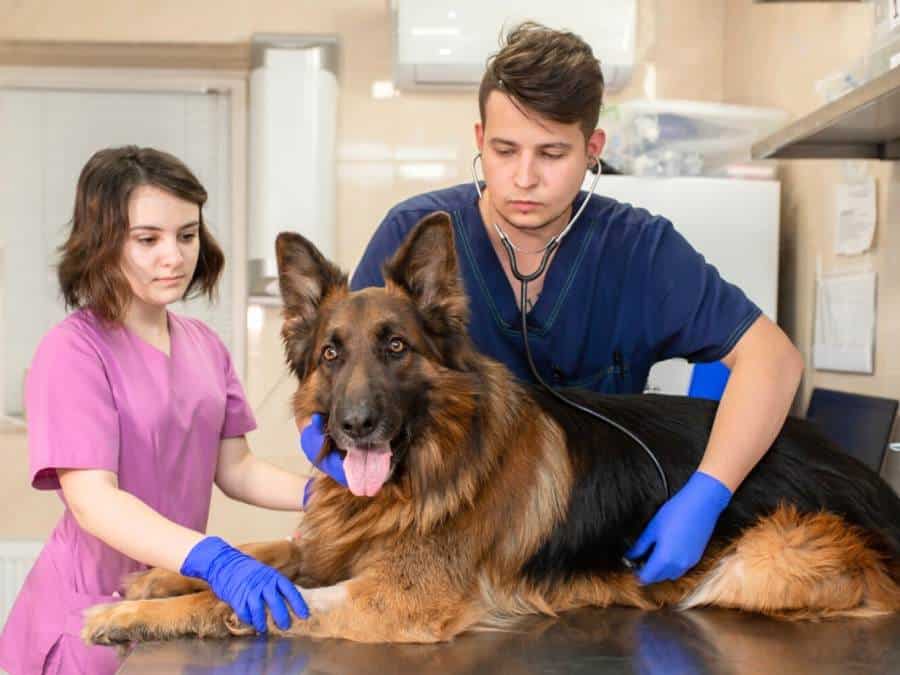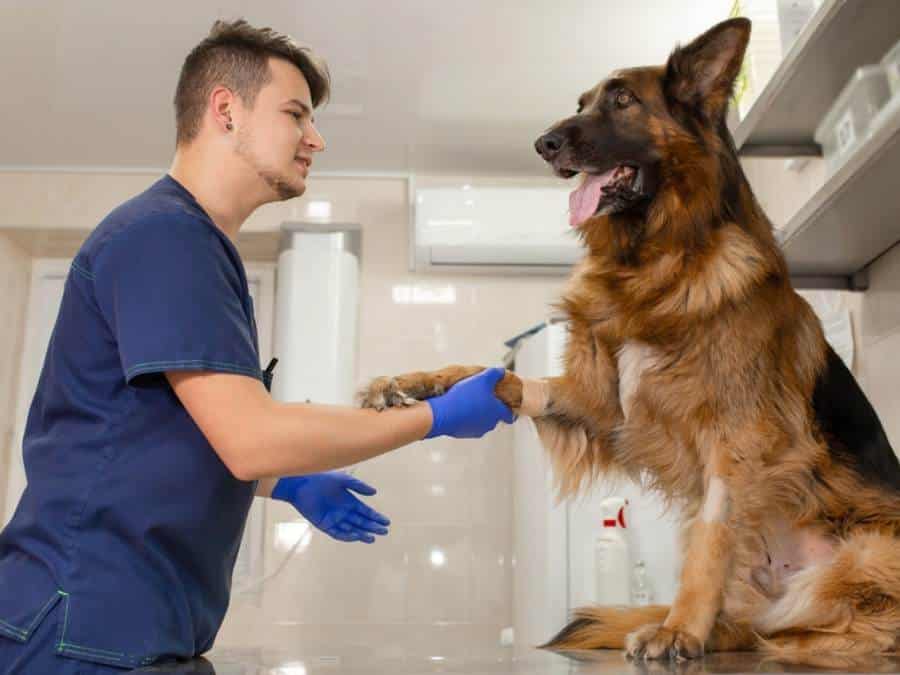Understanding ear infections in German Shepherds is crucial for any owner, as these infections can cause significant discomfort and, if left untreated, may lead to more serious health issues.
This article is designed as a comprehensive guide, aimed at equipping you with the necessary knowledge to recognize, prevent, and effectively treat ear infections in your German Shepherd.
Please note that before I give you the home remedies for treating your German Shepherd’s ear infection, we will first explore how veterinarians diagnose and treat this condition.
This approach underscores the critical role of professional medical intervention while also providing you with supportive care options to manage at home.
Why Do German Shepherds Get Ear Infections?
Ear infections in dogs can be classified into three main types:
- Otitis externa (Infection of the outer ear)
- Otitis media (Infection of the middle ear)
- Otitis interna (Infection of the internal ear)
German Shepherds are particularly prone to otitis externa due to their large, open ears, which can easily trap dirt, moisture, and debris.
The ear canal of a German Shepherd is more vertical compared to other breeds, which can lead to poor air circulation and moisture retention, creating an ideal environment for bacteria and yeast to grow.
The genetics of German Shepherds also plays a role in their susceptibility to ear infections. Their immune system can be predisposed to allergic reactions, which often manifest in the skin and ears, leading to inflammation and infection.
Environmental factors, such as exposure to water, can exacerbate these conditions, making regular ear care a crucial part of a German Shepherd’s grooming routine.
German Shepherd Ear Infection Symptoms
Identifying the symptoms of an ear infection early can make a significant difference in the outcome for your German Shepherd. Common signs include:
- Head Shaking or Tilting: One of the first signs many owners notice is their dog frequently shaking their head or tilting it to one side. This is a reaction to the discomfort or pain in the ear.
- Scratching at the Affected Ear: Your dog may paw at their ear or try to rub it against furniture or the floor to relieve itching or discomfort.
- Redness and Swelling: The ear canal and outer ear may appear red and swollen due to inflammation.
- Odor and Discharge: A strong, unpleasant smell often accompanies ear infections, along with a visible discharge that can be black, yellow, or brown.
- Loss of Balance or Hearing: In severe cases, an infection can affect your dog’s balance or lead to temporary hearing loss due to the swelling blocking the ear canal.
- Behavioral Changes: Pain and discomfort can make your dog more irritable or anxious than usual.
Prompt recognition of these symptoms and consultation with a veterinarian can prevent the progression of the infection and avoid more serious complications.

Diagnosing Ear Infections in German Shepherds
Here’s an overview of the diagnostic process for ear infections in German Shepherds:
- Visual Examination: The vet will perform a visual inspection of the outer ear, looking for signs of redness, swelling, discharge, or any abnormalities like polyps or growths.
- Otoscope Examination: Using an otoscope, the veterinarian can examine the ear canal and eardrum more closely. This allows for the identification of deeper issues, such as foreign bodies, excessive wax buildup, eardrum perforation, or deeper infections that are not visible with a surface examination alone.
- Cytology: Cytology involves collecting a sample of the ear discharge with a swab and examining it under a microscope. This test is pivotal in identifying the type of organisms causing the infection, such as bacteria, yeast, or ear mites.
- Culture and Sensitivity Testing: In cases where the infection is severe, recurrent, or does not respond to initial treatment, a culture and sensitivity test may be performed. This involves sending a sample of the ear discharge to a laboratory to grow the bacteria or yeast present.
- Allergy Testing: Since allergies are a common underlying cause of ear infections in German Shepherds, allergy testing may be recommended for dogs with recurrent or chronic ear infections.
- Advanced Imaging: In rare cases, advanced imaging techniques such as X-rays, CT scans, or MRIs may be necessary to diagnose middle or inner ear infections, especially if the dog is experiencing severe symptoms such as balance issues or neurological signs.
Through a combination of these diagnostic methods, veterinarians can accurately identify ear infections in German Shepherds, determine their underlying causes, and develop an effective treatment plan.

German Shepherd Ear Infection Treatment
Here’s a comprehensive look at the treatment options available for managing ear infections in German Shepherds:
Medicated Ear Drops
The cornerstone of treating most ear infections is medicated ear drops. These drops often contain a combination of antibiotics to fight bacteria, antifungals to combat yeast, and corticosteroids to reduce inflammation and discomfort.
The specific type of ear drops prescribed will depend on the results of the cytology and, if performed, culture and sensitivity tests.
Oral Medications
In addition to topical treatments, oral medications may be necessary, especially if the infection is deep-seated or if there are signs of a systemic infection.
Antibiotics or antifungal medications can help treat the infection from the inside out. For dogs with allergies contributing to ear infections, antihistamines or corticosteroids may also be prescribed to control the allergic response.
Ear Cleaning
Proper ear cleaning is an essential part of treating ear infections. Your veterinarian might clean your dog’s ears during the visit to remove debris, wax, and discharge.
They can also demonstrate how to safely clean the ears at home. A special ear-cleaning solution may be recommended for use in conjunction with the medicated drops to help keep the ear canal clean and dry.

Pain Management
Ear infections can be quite painful, so pain management is a critical aspect of treatment.
Nonsteroidal anti-inflammatory drugs (NSAIDs) may be prescribed to relieve pain and reduce inflammation, improving your dog’s comfort during recovery.
Addressing Underlying Causes
For effective long-term management, it’s important to address any underlying causes of the ear infection.
This might involve dietary changes for dogs with food allergies, regular ear cleaning routines to prevent wax buildup, or managing environmental allergens.
Surgery
In severe or chronic cases where conventional treatments have failed, or if there is significant damage to the ear structure, surgery may be considered.
Surgical options can range from removing polyps or other obstructions to more extensive procedures like a total ear canal ablation (TECA) for end-stage ear disease.
By closely following the veterinarian’s instructions and addressing any underlying health issues, most ear infections can be successfully treated, allowing your German Shepherd to return to their happy, active self.

German Shepherd Ear Infection Home Remedies
While veterinary care is paramount for diagnosing and treating ear infections in German Shepherds, certain home remedies can complement medical treatments and provide relief for your pet.
However, it’s crucial to consult with your veterinarian before trying any home remedies to ensure they are safe and suitable for your dog’s specific condition.
Here are some supportive care and home remedy options to consider:
1. Regular Ear Cleaning
Maintaining a routine of gentle ear cleaning can help prevent the buildup of wax and debris, which can contribute to infections.
Use a vet-recommended ear cleaning solution by applying it to the ear and gently massaging the base of the ear to help break up accumulated material.
Wipe away the loosened debris with a cotton ball or soft cloth. Avoid using cotton swabs deep in the ear canal to prevent injury.
My favorite ear cleaner is these PetMD ear wipes on Amazon.

You can also use this Gentle Ear Wash for Dogs to effectively clean debris and wax from your dog’s ear.

2. Warm Compresses
Applying a warm compress to the outer ear can help soothe discomfort and reduce inflammation.
Soak a clean cloth in warm water, wring out the excess, and gently hold it against your dog’s ear for a few minutes. Be sure the temperature is warm, not hot, to avoid burning your dog’s skin.
3. Dietary Adjustments
If your German Shepherd’s ear infections are linked to allergies, dietary adjustments may help reduce flare-ups.
Working with your vet or a veterinary nutritionist to identify potential allergens in your dog’s diet and transitioning to a hypoallergenic or limited-ingredient diet could make a significant difference.
4. Omega-3 Fatty Acids
Supplements rich in omega-3 fatty acids, like fish oil, can help reduce inflammation and support overall skin health.
These supplements may help decrease the severity and frequency of ear infections when used as part of a comprehensive care plan.
I generally recommend Nordic Naturals Omega-3 for Dogs to my friends.

5. Probiotics
Adding probiotics to your dog’s diet can help support a healthy balance of bacteria in the body, including the ears.
Probiotics are beneficial for German Shepherds with chronic ear infections, especially those caused by yeast overgrowth.
You can check out PetNC Pre & Probiotic soft chews for dogs on Amazon.

6. Aloe Vera
For soothing mild irritation in the outer ear, pure aloe vera gel can be applied gently. Aloe vera has natural anti-inflammatory properties.
Ensure the aloe vera is free of additives and alcohol, which can be irritating.
I found this Seven Minerals Organic Aloe Vera Gel made from freshly cut aloe leaves on Amazon.

7. Apple Cider Vinegar
Diluted apple cider vinegar can create an environment less hospitable to yeast and bacteria. However, this should only be used if the ear drum is intact and with your vet’s approval. A typical dilution is one part vinegar to one part water, used to clean the outer ear area only.
It’s essential to remember that while these home remedies can provide comfort and aid in prevention, they should not replace professional veterinary treatment for ear infections.
Always prioritize your vet’s recommendations and use home remedies as a supportive measure.
Causes of Ear Infections in German Shepherds
Several factors can contribute to the development of ear infections in German Shepherds:
- Allergies: Allergic reactions to food, pollen, mold, or dust mites can lead to ear inflammation and infection.
- Moisture: Water that gets trapped in the ear canal from bathing, swimming, or wet weather can create a breeding ground for bacteria and yeast.
- Foreign Bodies: Grass awns, ticks, and other debris can get lodged in the ear, causing irritation and infection.
- Ear Mites: These tiny parasites can infest the ear canal, leading to intense itching and inflammation.
- Bacteria and Yeast: The warm, moist environment of the ear canal can encourage the overgrowth of bacteria and yeast, leading to infection.
- Genetic Predisposition: The ear structure and immune system of German Shepherds can make them more susceptible to ear infections.
Understanding these causes is crucial for preventing ear infections in your German Shepherd. Regular ear checks and maintenance are essential parts of their care routine.
RELATED:
- German Shepherd Ear Mites: Symptoms, Treatment & Causes
- German Shepherd Skin Yeast Infection Treatment At Home

How to Prevent Ear Infections in German Shepherds
Prevention is key to ensuring your German Shepherd stays free from painful ear infections. Here are strategies to help protect your dog:
- Regular Ear Cleaning: Use a veterinarian-approved ear cleaner to gently clean your dog’s ears, removing wax, debris, and moisture.
- Dry Ears Thoroughly: After bathing or swimming, dry your dog’s ears carefully to prevent moisture buildup.
- Diet and Allergies: Monitor your dog’s diet for potential allergens that could trigger ear infections and consult with a vet for allergy testing if needed.
- Grooming: Keep the hair around the ears trimmed to promote better air circulation.
- Regular Vet Checks: Routine check-ups can help catch and address ear issues before they turn into infections.
- Avoid Over-Cleaning: Over-cleaning can irritate the ear canal, leading to more problems. Follow your vet’s advice on the frequency of ear cleaning.
Implementing these preventive measures can significantly reduce the risk of ear infections and contribute to the overall health and well-being of your German Shepherd.
Final Remarks
German Shepherd ear infections can be a significant concern for owners, but with the right knowledge and care, they can be effectively managed. Recognizing symptoms early, understanding the causes, and adhering to a preventative care routine are key to ensuring your German Shepherd lives a comfortable and happy life. Always consult with your veterinarian for the best course of action for your pet’s specific needs.
Frequently Asked Questions
1. Are ear infections common in German Shepherds?
Yes, ear infections are relatively common in German Shepherds. This breed’s large, erect ears can easily trap moisture and debris, creating an environment conducive to infections.
2. Can a German Shepherd ear infection heal itself?
It is very rare for a German Shepherd ear infection to heal itself without treatment. Without proper medical intervention, an ear infection is likely to worsen, potentially leading to more serious health issues.
3. How serious is a German Shepherd ear infection?
An ear infection can range from mild to very serious, depending on the extent of the infection, whether it’s external, middle, or inner ear infection, and how long it goes untreated. If left untreated, an ear infection can lead to chronic pain, hearing loss, and even spread to other parts of the body, including the brain in severe cases.
4. Are ear infections painful for German Shepherds?
Yes, ear infections can be quite painful for dogs. The inflammation and buildup of pressure in the ear canal can cause significant discomfort, leading to symptoms such as scratching at the affected ear, head shaking, and apparent distress.
5. How long do German Shepherd ear infections last?
The duration of a dog ear infection depends on the severity of the infection, how quickly treatment is started, and whether any underlying conditions are contributing to the infection. With proper treatment, many ear infections start to improve within a few days, but it can take up to a few weeks for the infection to be completely resolved.
FURTHER READING:




